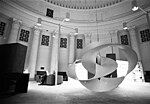MIT Department of Physics
Incomplete lists from August 2008Massachusetts Institute of TechnologyPhysics departments in the United States

The MIT Department of Physics has over 120 faculty members, is often cited as the largest physics department in the United States, and hosts top-ranked programs. It offers the SB, SM, PhD, and ScD degrees. Fourteen alumni of the department and nine current or former faculty members (two of whom were also students at MIT) have won the Nobel Prize in Physics.
Excerpt from the Wikipedia article MIT Department of Physics (License: CC BY-SA 3.0, Authors, Images).MIT Department of Physics
Memorial Drive, Cambridge Cambridgeport
Geographical coordinates (GPS) Address Nearby Places Show on map
Geographical coordinates (GPS)
| Latitude | Longitude |
|---|---|
| N 42.3597177 ° | E -71.0908492 ° |
Address
6C PDSI (Building 6C)
Memorial Drive
02142 Cambridge, Cambridgeport
Massachusetts, United States
Open on Google Maps








